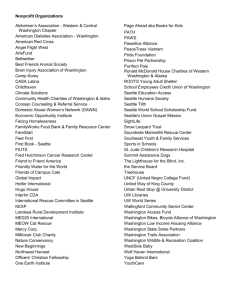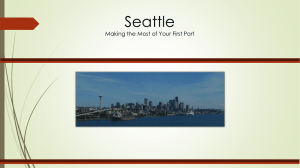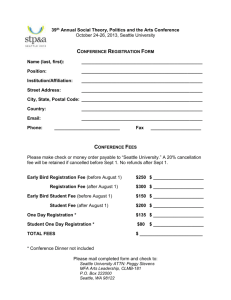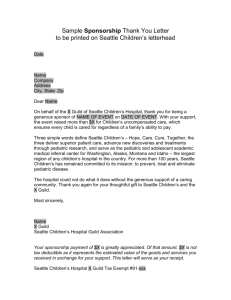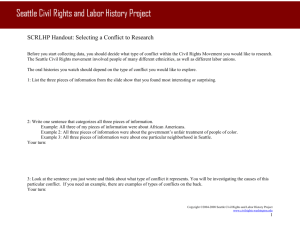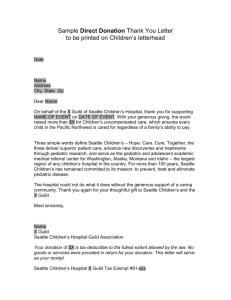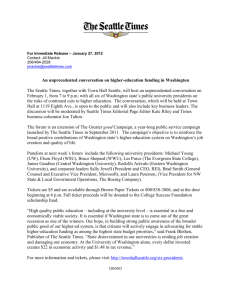Seattle Area Narcotics Anonymous
advertisement
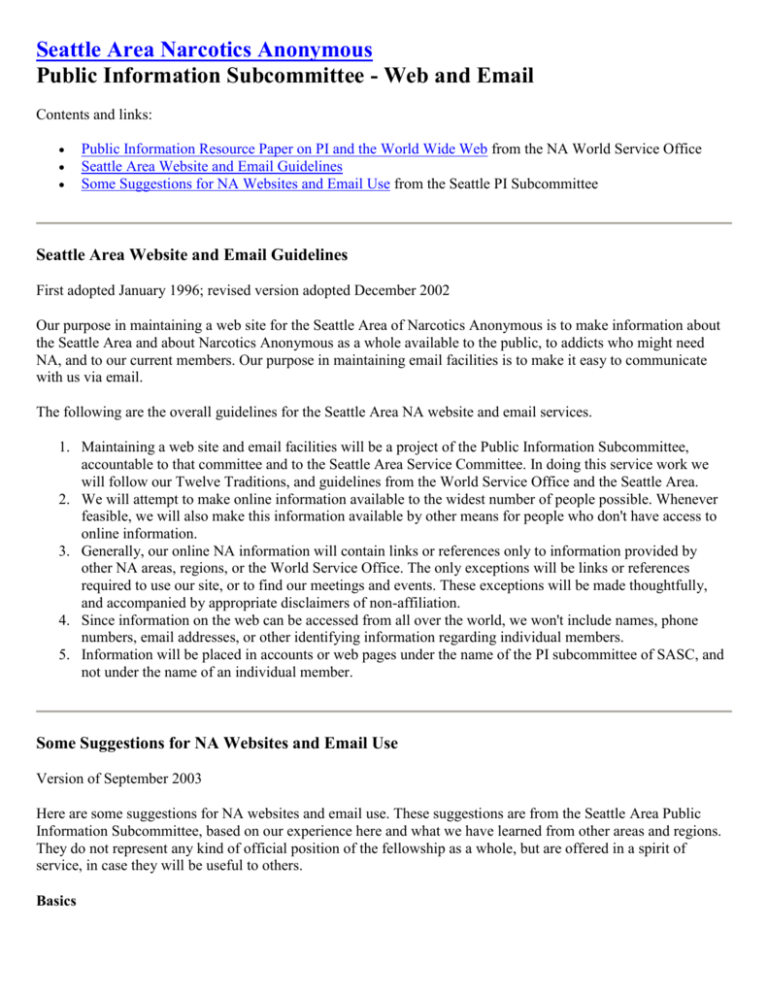
Seattle Area Narcotics Anonymous Public Information Subcommittee - Web and Email Contents and links: Public Information Resource Paper on PI and the World Wide Web from the NA World Service Office Seattle Area Website and Email Guidelines Some Suggestions for NA Websites and Email Use from the Seattle PI Subcommittee Seattle Area Website and Email Guidelines First adopted January 1996; revised version adopted December 2002 Our purpose in maintaining a web site for the Seattle Area of Narcotics Anonymous is to make information about the Seattle Area and about Narcotics Anonymous as a whole available to the public, to addicts who might need NA, and to our current members. Our purpose in maintaining email facilities is to make it easy to communicate with us via email. The following are the overall guidelines for the Seattle Area NA website and email services. 1. Maintaining a web site and email facilities will be a project of the Public Information Subcommittee, accountable to that committee and to the Seattle Area Service Committee. In doing this service work we will follow our Twelve Traditions, and guidelines from the World Service Office and the Seattle Area. 2. We will attempt to make online information available to the widest number of people possible. Whenever feasible, we will also make this information available by other means for people who don't have access to online information. 3. Generally, our online NA information will contain links or references only to information provided by other NA areas, regions, or the World Service Office. The only exceptions will be links or references required to use our site, or to find our meetings and events. These exceptions will be made thoughtfully, and accompanied by appropriate disclaimers of non-affiliation. 4. Since information on the web can be accessed from all over the world, we won't include names, phone numbers, email addresses, or other identifying information regarding individual members. 5. Information will be placed in accounts or web pages under the name of the PI subcommittee of SASC, and not under the name of an individual member. Some Suggestions for NA Websites and Email Use Version of September 2003 Here are some suggestions for NA websites and email use. These suggestions are from the Seattle Area Public Information Subcommittee, based on our experience here and what we have learned from other areas and regions. They do not represent any kind of official position of the fellowship as a whole, but are offered in a spirit of service, in case they will be useful to others. Basics Go through your Area or Regional Public Information Committee. Follow the guidelines from WSO. Currently the only information from WSO on the web is Public Information Resource Paper on PI and the World Wide Web, which includes some preliminary guidelines. Your area or region may also want to adopt guidelines of your own. (Please feel free to use or adapt the Seattle Area guidelines.) What to Include? At a minimum, include a meeting schedule, the local helpline number, and a link to www.na.org. In Seattle we also have activities, service committee information, area newsletters, helpline numbers elsewhere in the region, and links to all other areas in the region and to the region itself. NA web sites serve multiple users, including addicts who might be seeking recovery, current NA members living in the area, NA members from out of town who are visiting and looking for meetings, professionals working in the area of drug addiction, relatives of addicts, and the general public. The wide range of users should be considered when deciding what to include on the site. For example, while NA picnics or dances are probably only of direct interest to NA members, listing these NA activities presents an image to potential members and the public of an active fellowship that has fun in recovery. Similarly, listing all the Area service committees and their meeting times helps members find the service committee meetings, and also shows others the range of service activities that we undertake. On the other hand, Area Committee meeting minutes and similar internal service committee documents are probably not appropriate for posting on a public website. (In Seattle, we distribute Area minutes by email to members who have email addresses, and on paper by regular mail to others. Distributing some of the copies by email saves money and paper, but we don't want to require email access to do Area service, so we keep the paper option as well.) Have a clean, simple design, with modest use of graphics. Ask: does this element help carry the message? People go to the site to find out about NA, not to see spinning 3-D NA logos. Also, large images make it slower to download a page, which may be a problem with a slow internet connection. Stick with standard html. If you need a tag on your site that says it is best viewed with a particular browser, rethink the design. Every page on your site should have a link back to the home page. Make your web site universally accessible, so that blind addicts, addicts with muscle control problems, and others can all access it. Among other things, there should be an "alt" tag on all images. Use tables carefully, and don't use frames. Test your pages with a text-only browser as well as a graphical one. See a good website dealing with universal access for more recommendations on universal access. To format information on the web pages, html is usually best. If you need to have more precise control over layout (for example, for a newsletter that prints nicely) use either .pdf or .rtf format. Don't use a proprietary format that can only be read using the word processing program from one company. An advantage of pdf is that it provides very precise control over layout and presentation, and also is read-only (thus at least providing a small barrier to copying and modifying your information). Readers for pdf are free, but software to produce it costs money. (If your document is all ready and just needs to be converted to pdf, you may be able to find a computer access store in your area that will let you rent a computer with the necessary software by the minute - if all you need to do is prepare the pdf version, this can be done quickly.) An advantage of rtf (Rich Text Format) is that most word processors can save documents in this format, so you won't need to buy any additional software to produce rtf documents. However, it isn't as good as pdf for precise layout, and if you put an rtf document on the web, it's trivial for anyone to download it, modify it slightly, and redistribute it. (This may or may not be an issue for the document in question, but it's something to consider.) Anonymity There isn't definitive guidance from the fellowship as a whole as to whether web pages are media at the level of press, radio, and film. (In other words, does the 11th Tradition apply to the web?) Our group conscience in the Seattle Area is that web pages are media at the level of press, radio, and film. In keeping with this group conscience, our guidelines prohibit putting names, phone numbers, email addresses, or other identifying information regarding individual members on our web pages. Obviously we shouldn't list the full names of members on any NA website. But our group conscience goes further than this: we don't post personal phone numbers, email addresses, or home addresses either (even with just someone's first name). The situation where this is most likely to be an issue is in posting contact information for a committee or event. The way we handle this is by listing an NA committee email address instead, for example unityday@seattlena.org (see NA Committee Email). If the contact person doesn't have email, we list our general contact address and pass on any messages. Even if web pages are not media at the level of press, radio, and film, there are still potential anonymity problems, and this guideline is a useful one to follow. For example, putting an individual member's name, email, or phone number on an NA web site (or even putting the phrase "Narcotics Anonymous" and a member's name, email, or phone number somewhere on any web page) means that a web search may reveal that the person is an NA member. This includes listing just a first name along with a phone number or email address. Even if the person doesn't care about this now, he or she may later, and it can sometimes be hard to get rid of information on the web. Relation between Area and Regional Web Sites In our region (Washington/Northern Idaho), there is a regional web site, and most areas within the region also have their own sites, separate from the regional one. In other regions (for example Minnesota) there is just a regional web site, which contains area information as well. Either way of doing this works. The advantage of areas having separate sites is that it may be easier to keep them current, since each area has access to its own information. The advantage of having just a regional site is that it will cost less. If there are separate area sites, we suggest that each area have a link to its region, and the region have links to the site for each area in that region Hosting and Maintaining the Website NA websites should be in the name of the area or region, not an individual. Either use a commercial service provider or a community network -- in keeping with the 6th Tradition, never use a free service that pops up advertisements to fund the site. At least two people should know the password and how to maintain the site. Have a plan for keeping it up-to-date, and put a "last updated" date on it, including the year. (Unfortunately sites are not always maintained, and including a date lets people know whether the information is current.) Sites should be stable -- it's not good to have NA web sites that appear and then shortly thereafter disappear. Many service providers can make available a hit counter (showing how many visits there have been to a web page), or usage statistics. The usage statistics can be useful for a Public Information Subcommittee or Area to know whether a web site has been a good investment of time and money. However, for the Seattle site we explicitly decided not to display a hit counter on our home page -- running NA web site popularity contests didn't seem like the right thing to do. Instead, if our Area asks about usage, we use our service provider's tools to get the requested information. Your service provider may make available detailed web logs that show the internet addresses of each individual computer that has accessed the pages. The address in a web log of a server machine that handles tens of thousands of users doesn't compromise anyone's anonymity. However, the internet address of a computer at a home, a small company, or small department could. Therefore any detailed web logs for NA sites should be treated as confidential information, to respect the anonymity of those viewing the site. Domain Names Consider buying your own domain name -- they are pretty cheap these days. Having your own domain name has several advantages: first, it may be easier to remember than a web address that refers to pages in another provider's web space, and second, you can keep the same web address even if you change service providers. We suggest using either a .org extension or a country name extension (for example, .us or .au or .de), but not a .com extension (since NA is not a profit-making organization). Before deciding on a particular domain name, try pronouncing it out loud, and ask several other people to read it and say it as well, to make sure it is as clear and easy to remember as possible. For example, we decided that seattlena.org was clearer than naseattle.org (what is a nase attle?). Opinions differ on using hyphens in domain names: seattle-na.org is probably clearer than seattlena.org, but you have to figure out where the hyphen character is to type it. Most domain name registrars will have a "whois" service that lets you look up possible domain names to see if they are available or who the current owner is. When you register a domain name, you may be asked to provide a contact name and address, and this will then come up when anyone does a whois query. We therefore suggest (anonymity) that you not use a personal name or address when registering an NA domain name. Be creative if necessary when filling in forms -- for example in Seattle we filled in the Administrative Contact as last name="Committee", first name="Public Information". NA Committee Email Have a contact email address listed on the home page (not a personal email address) -- for example we use info@seattlena.org. If your service provider supports this, you may want to set up other addresses as well. For example, in the Seattle Area, most service committees and positions have an email address (for example, area-chair@seattlena.org, literature@seattlena.org, etc.). Most of these are aliases that forward to a personal address, but a few go to mailboxes on the seattlena.org site. (If you do set up a mailbox, make sure it gets checked regularly.) Having these aliases allows us to include contact information for area trusted servants on the Seattle Area web pages without putting their personal email addresses on the pages. Handling the email to the general contact address is in some respects like answering the helpline. Please see "A Guide to Phoneline Service" for recommendations on handling requests from addicts seeking recovery, partners/friends/children of addicts, people trying to get in touch with a member, and so forth. Here are notes on a few other commonly received messages, and how we handle them. Please link to our page - for pages done by official NA groups, we tell them that we decided just to have links to WSO's page, and to pages for other areas in our region, rather than to areas and regions outside ours, just to keep the page updating manageable. So they could contact WSO to get on that page. Non-NA organizations: our 6th Tradition says "An NA group ought never endorse, finance, or lend the NA name to any related facility or outside enterprise ..." and in the context of the web our guidelines interpret this to mean no links to related non-NA organizations. It is always fine for someone else to have a link to our page, however. Convention announcements - we have a section on the activities page for events in nearby regions (where 'nearby' means roughly Oregon, British Columbia, and Montana). Otherwise, if the convention is far away we don't post it. (It's useful to have a policy on what will be posted on your area or regional web pages, so that there is a clear way to handle such requests.) Need information on drug addiction for a term paper - point them to the Facts About Narcotics Anonymous page (linked from our page). Spam: spam is an outside issue. Just delete it. Personal Web Pages and Email As discussed above, NA area and regional web sites should not be placed on personal web pages. Also as discussed above (anonymity), we suggest that members not identify themselves as NA members on any web pages. Personal email is clearly not at the level of press, radio, and films, so there is no anonymity issue as such with members identifying themselves as NA members in email. However, issues can still arise in connection with anonymity and email, which are worth mentioning here. Email is all too easy to forward widely. If a message is forwarded to a newsgroup, it will often end up being archived on a web site, and from there be visible from anywhere on the web. So please be thoughtful about forwarding email. Also, be thoughtful about sharing personal email addresses of other NA members. We have sometimes seen members send email to all the NA members they know. Then someone else answers the message, perhaps including some more addresses, and shortly individual email addresses (and perhaps full names) are broadcast much further than some people want. One way to avoid this is to use the bcc facility when sending email to several people (bcc stands for "blind carbon copy" - the email addresses on the bcc list will receive the message, but these addresses aren't visible in the message header).

